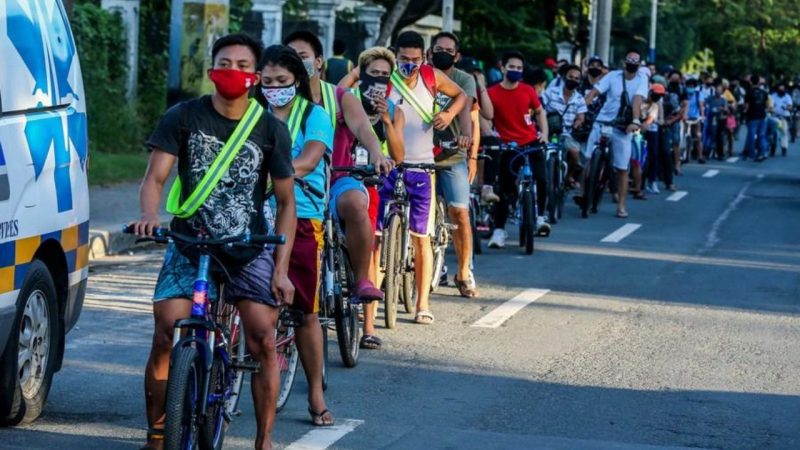In this provided photo, individuals on bicycles eagerly await the distribution of free helmets and reflective sashes, generously provided by a non-governmental organization in Manila. (Photo courtesy of Xinhua/Rouelle Umali)
To combat the detrimental effects of climate change caused by motorized transportation and its resulting greenhouse gas (GHG) emissions, Climate Change Commissioner Albert Dela Cruz advocates for the adoption of electric vehicles (EVs) and non-mechanized modes of transportation. He emphasizes that transitioning to EVs would propel the country’s decarbonization efforts, effectively addressing atmospheric pollution.

Commissioner Dela Cruz’s stance aligns with the sentiments expressed by National Economic Development Authority (NEDA) Secretary Arsenio Baliscan. He announced that Executive Order 12 series of 2023 will undergo review in February 2024 due to concerns raised by various stakeholders in the electric vehicle industry. These concerns primarily revolve around the exclusion of e-motorcycles from the proposed tax breaks.
Including e-motorcycles in the tax incentives would enable a significant portion of Filipinos to transition to affordable and eco-friendly transportation options, thus mitigating pollution concerns in highly urbanized communities.
The advocacy group Philippine Business for Environmental Stewardship (APBES) has emphasized the need to revise EO 12 to ensure inclusivity by incorporating motorcycles and other two-wheeled vehicles. This broader scope would enable individuals from different socioeconomic backgrounds to embrace green technology, particularly in light of the soaring gasoline prices.
Promoting the adoption of EVs serves as one strategy for the government to decarbonize the country and reduce reliance on fossil fuels for power generation. Additionally, Commissioner Dela Cruz proposes revisiting a measure introduced by President Ferdinand ‘Bongbong’ Romualdez Marcos Jr. during his tenure as a senator. The measure seeks to revitalize a centuries-old, widely popular mode of transportation—the bicycle.
Senator Marcos filed Senate Bill 2924, also known as the proposed Bicycle Commuters Incentives Act of 2011, which aims to provide incentives to encourage the use of bicycles and other non-motorized vehicles for daily commuting and travel between workplaces, schools, churches, malls, and other destinations. The program primarily targets employees and students as direct participants, along with schools, companies, and institutions that can facilitate its implementation. Riders and users would benefit from bicycle-related facilities and tax deductions, while indirect participants would receive tax deductions for expenses and corporate social responsibility programs.
Ultimately, Marcos, who chaired the Senate committee on local government, emphasized that cultivating a bike-commuting culture through the incentives program would effectively address various interconnected social issues plaguing the country. These include climate change, air pollution, traffic congestion, escalating fuel and commodity costs, personal health problems, and other related concerns.
Dela Cruz highlights that widespread bicycle usage among the public would not only significantly reduce GHG emissions but also contribute to a healthier population, alleviate road congestion, and reduce the demand for parking facilities.
“Considering the overarching objectives of SB 2924 in tackling the fundamental issues facing our society, it’s crucial to acknowledge the extensive benefits associated with bicycle use, spanning environmental conservation, urban planning, and public health,” remarked the climate official.
He further noted that by substantially decreasing carbon emissions, more people would be shielded from cardiovascular health risks associated with transportation-related pollution.
“Moreover, bicycle users would enjoy cost savings in terms of transportation expenses, as they would rely less on motorized modes of transport, which have become increasingly expensive due to the volatile prices of gasoline and diesel fuel,” he concluded.
(ai/mnm)


